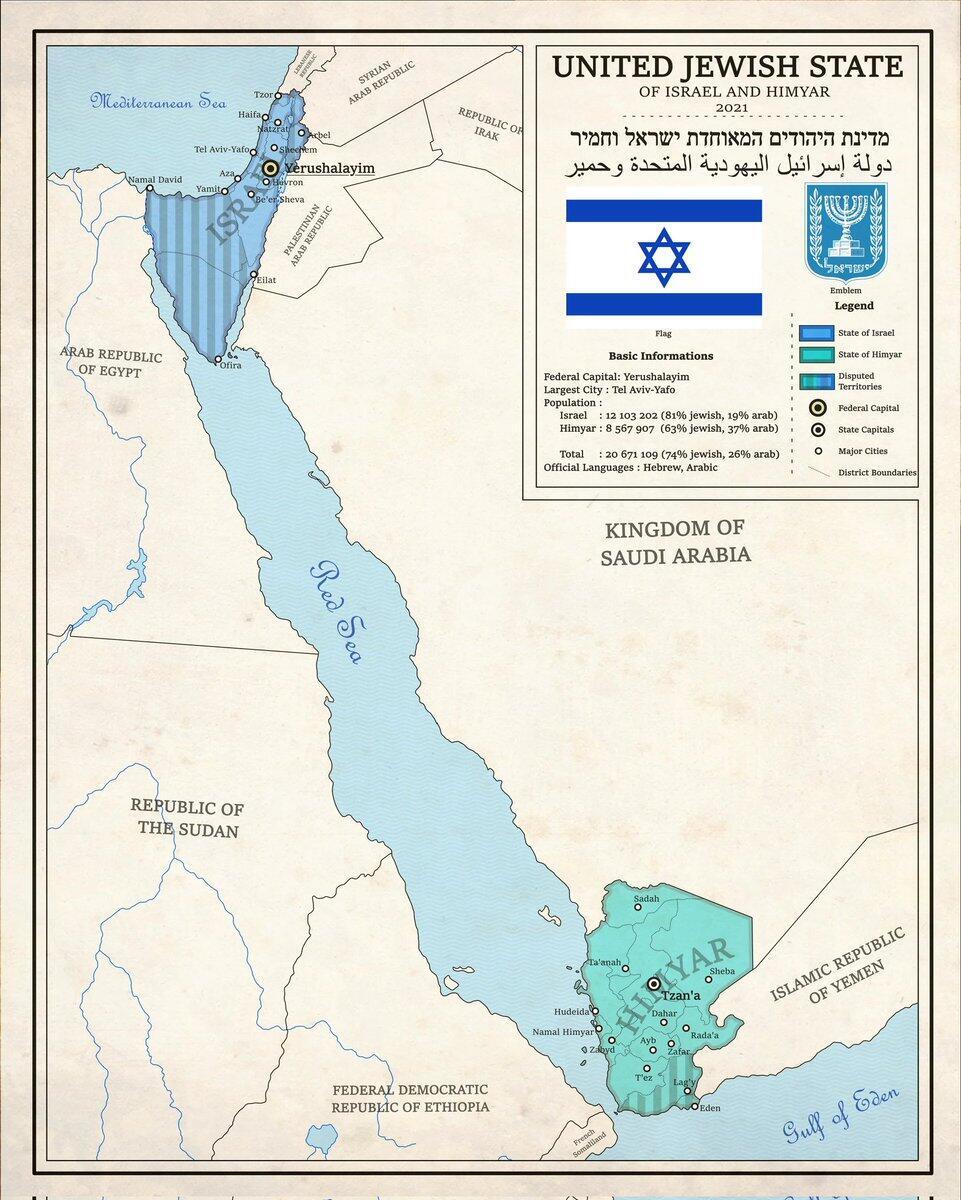Not particularly a household name in Israel before the war, the Yemeni group called Houthis have made their way to our collective consciousness recently as an Iran-funded terrorist group, lecturing Israel about stolen land, but is it possible they're actually sitting on land once occupied by Jews?
Read more:
That seems to be the case, according to orientalist and Arab culture scholar Yoni Bate, who recently posted maps to that effect on social media. "While blaming Israel for being an artificial entity occupying Muslim land, it's actually the Houthis who now live on land once belonging to the Himyarite Kingdom, an ancient political entity located in the southern highlands of Yemen, encompassed both the kingdom itself and the region it asserted control over.
Its capital was the historic city of Zafar, situated in close proximity to the present-day city of Sana'a. With the growth of its population, the seat of power in the Himyarite Kingdom eventually shifted to Sana'a during the fifth century. Following the establishment of their kingdom, it came under the rule of kings hailing from the dhū-Raydān tribe. At some point, between the 4th and 5th centuries, Judaism was adopted as the de facto state religion.
"When I saw the Houthis talk about how Israel is an artificial crusading entity stealing Palestinian land, I told myself someone has to set the record straight. I posted the map to troll them," he said.
Despite partially jesting to make a point, it's actually a serious one. "As a Jew and Israeli in these trying times, it was important to shine an important light on history. People were shocked. Actually, hardly anyone in Israel knew about it."
Were the Yemenis more familiar with it?
"It's more well-known there. Reactions differed between those who said those Jews later converted to Islam, those who said they were European Jews that had nothing to do with Israel, while others were more welcoming, saying they'd wish Jews were still in Yemen instead of the Houthis.
"I personally was taken aback by the fact that there was a Jewish entity just 1200 miles away, the only Jewish Kingdom outside of Israel. Some historians claim a similar kingdom in Ethiopia, but proof is scarce. Here we have actual, undeniable truth of a kingdom that was around before the advent of Islam, ruling for 150 years and even expanding toward Ethiopia at one point. Now we have a terror group there, firing rockets at us. It's an anomaly someone had to point out."
Jewish heritage
Historical evidence points out that the Himyarite Kingdom, a confederation of tribes, left behind inscriptions and monumental structures that reveal a prosperous and culturally advanced society. These remnants testify to their wealth, sophistication and literacy. The Himyarites practiced a diverse range of local religions, reflecting their rich spiritual traditions.
By the 3rd century AD, trade had been flourishing across the region. Yemen, known for its abundant supply of frankincense and myrrh, became a key supplier to the Roman Empire. This trade network expanded even further, with the renowned Roman writer and philosopher Pliny the Elder, noting in the late 1st century AD that the Himyarite Kingdom was among "the richest nations in the world."
Positioned as a vital hub of international trade, the Himyarite Kingdom facilitated connections between the Mediterranean, the Middle East and India, fostering economic and cultural exchanges that shaped the region's history.
The Himyarite kings appear to have abandoned polytheism and converted to Judaism around the year 380. From the 380s, temples were abandoned and dedications to the old gods ceased, replaced by references to Rahmanan, "the Lord of Heaven" or "Lord of Heaven and Earth". One of the first Jewish kings, Tub'a Abu Kariba As'ad, is believed to have converted following a military expedition into northern Arabia in an effort to eliminate Byzantine influence.
"During excavations in Zafar, the capital of the Himyarite Kingdom, significant evidence was found pointing to a strong Jewish presence in the region," Bate explained. "Rooms that served as mikvehs, as well as signet rings featuring a carved menorah, were uncovered. Inscriptions discovered in Yemen in recent years contain words like 'Amen' and 'Shalom', along with Jewish names such as Yitzhak and Yehuda. References to 'the people of Israel' and an inscription in memory of Judah were found in the ancient language of Yemen's Jewish community.
Additionally, there are indications of Hebrew inscriptions listing divisions of the priesthood, as well as the existence of Jewish synagogues and cemeteries. These findings highlight the significant Jewish presence in the region where the Houthis reside today."
Why isn't this kingdom referenced anywhere in Rabbinical Judaism?
"It is estimated that the rabbis in the Land of Israel did not accept and did not want to accept them as kosher Jews, because they were not originally ethnically Jews. The conversion was not kosher enough for them and they simply ignored their existence. The Himyarite rulers tried to navigate their way between the conflicts of the great powers at the end of antiquity, but in their efforts, they ended up in a catastrophe. What's more Jewish than that?" says Bate with a smile.
According to Bate, the downfall of the Jewish kingdom began with the emergence of Yusuf Dhu Nuwas, a Jewish king. Bate refers to Ethiopian writings that depict Dhu Nuwas as a figure who persecuted Christians, carried out massacres and burned them alive on pyres in Najran, a city located in present-day Saudi Arabia. Interestingly, the story of this Jewish king appears to have some presence in the Quran.
A coup d'état ensued, with Dhu Nuwas, who had attempted to overthrow the dynasty several years earlier, assuming authority after conquering the Aksumite garrison in Zafār.
Bate provides insights into the historical context, stating that "based on testimonies, historical documents and archaeological findings, it can be inferred that Yemen had a significant and prosperous Jewish community during that period. The influential and esteemed status of the Jewish population led many non-Jewish residents to convert to Judaism.
"Rabbi Kapach, on the other hand, argues that there wasn't a mass adoption of Judaism, but rather the acceptance of monotheistic beliefs by the gentiles under the influence of the Jewish community. It is important to note that despite their conversion, they remained gentiles and did not adhere to the commandments of the Torah."
And just before the interview ends, Bate further emphasizes the importance of laying down facts for those who accuse Israel of colonialism. "When I hear people say we're not so-called original Jews, but some European colonialists who took over Muslim lands, this is something I can't stay silent about. It's my way of countering antisemites. The Houthis and their cohorts be damned."




